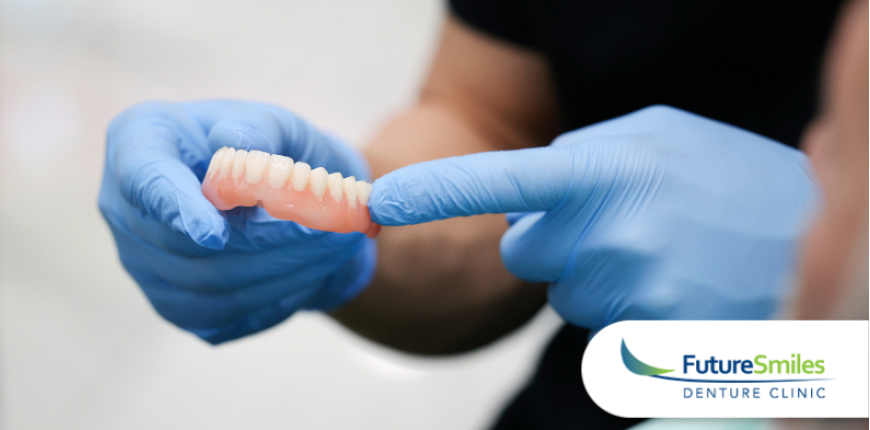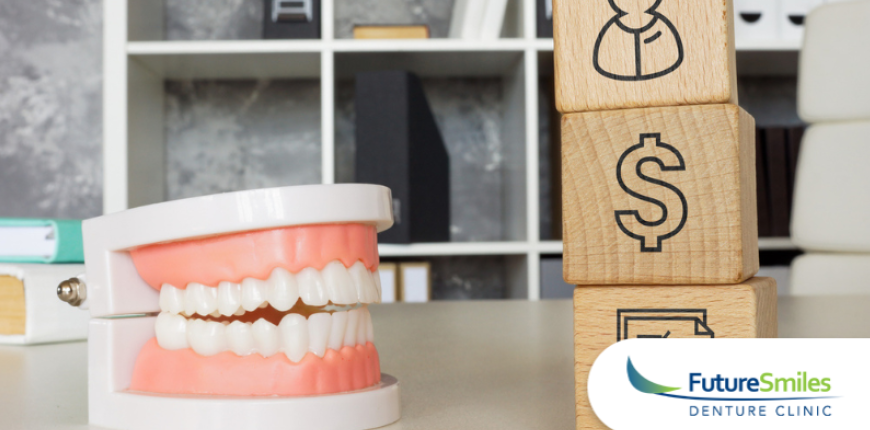As time goes on, even the most durable denture will likely require routine maintenance or repairs. Here are the main reasons why that is and how your Calgary denturist performs the various repair procedures.
If you've been wearing dentures for a while, you most likely know they require routine maintenance and repairs to keep them looking good and functioning well. But if you're new to dentures, you might be asking yourself why that is.
As with most dental appliances, complete or partial dentures can wear down or degrade after being used for a long period of time. Your dentures are used every day and put through a decent amount of stress while performing their vital functions. This means the longer you wear your denture, the more likely you will need to visit your denturist for a denture repair or revitalization.
Let's look at the main reasons why that is and how your denturist performs the various repair and revitalization procedures.
Two Locations to Serve You Better!
Have a denture emergency? Future Smiles Denture Clinic is committed to helping Calgarians with all of their denture care needs. From direct billing and house calls to FREE consultations and denture care advice for all patients — new or existing, our experienced denture care team at our NE and SW Calgary denture clinics are here to help. Contact us today for an appointment, and we'll get you smiling again in no time!
The Main Reasons Behind Denture Repairs
While dentures may require repairs for a number of different reasons, there are three primary ones that are usually responsible for the majority of cases. These three primary reasons are:
1. They've been dropped and suffered a crack or break:
This is the most common reason why a denture needs to be repaired by a denturist. Whenever a person is removing their denture, whether to clean it or put it away for the night, the potential for it to be dropped is present. Most people are hesitant to admit just how often they drop their dentures, but rest assured, it happens more frequently than you would think.
One of the best ways to protect your denture from suffering a crack or break due to being dropped is to obviously be careful when removing and inserting it. But as we know, life happens. Some other measures you can take to help limit the chances of a break or crack include filling up your bathroom sink with water or laying a towel down around the edges of your counter. By doing so, should you happen to drop your dentures while taking them out or putting them in, you'll cushion the blow and lower your chances of having them be damaged.
2. They don't fit properly anymore:
After you've been wearing your dentures for a while, you may begin to notice that they don't fit like they used to. This usually happens because the shape of your mouth has begun to change, which occurs when you no longer have any natural teeth remaining or they've been surgically removed. This is due to your jawbone gradually degrading because it is no longer receiving the support it needs from the roots of your natural teeth.
At the first sign of your dentures fitting improperly, schedule a visit with your denturist so you can get in to see them as soon as possible. Poorly fitting dentures can not only cause you pain or discomfort, but they can also be at a greater risk for breaking because they are being put under stress they most likely weren't designed to withstand.
3. Everyday wear and tear:
Even though dentures have become much more durable over the past few decades, they are not immune to the degradation that is caused by everyday wear and tear. After your dentures have been subjected to years of chewing and shifts in temperature, they can erode and wear down just like anything else. When this happens, complete and partial dentures are more prone to breaking.
Acidic foods and drinks can cause your dentures to wear down quicker, so avoiding them is one strategy to help keep the effects of time at bay. Regular visits to your denturist for routine maintenance and repairs are your best bet though.
5 FOODS YOU SHOULD INITIALLY AVOID WITH YOUR NEW DENTURES
How Your Denturist Performs Common Repair Procedures
Complete and partial dentures are primarily made from acrylic resin. This thermoplastic material works perfectly for dentures because it is durable, comfortable, attractive, and most importantly of all, repairable. More of the material can easily be added to a denture to reinforce it, or it can be bonded to a current denture to fix any fractures or damaged areas.
Two of the most common routine maintenance or repair procedures a denturist will perform are called a denture reline, and a denture rebase. Both involve addressing the denture base to varying degrees, with a reline being less complex and a rebase being more comprehensive. They are carried out as follows:
Denture reline
There are three different types of denture relines that can be carried out by your denturist. All involve resurfacing the area of your denture which comes in contact with your gums. The most common form, a hard reline, is carried out as such:
- A thin layer of the denture is shaved off by your denturist
- Putty is placed on the interior of the denture, similar to how an impression is made
- The denture is then either sent to a lab for processing or the denturist will do it in their clinic, depending on their operational capabilities
Denture rebase
A denture rebase is performed when the teeth of the denture are still in good condition, but the acrylic base has become damaged, worn, or faded. It is performed in the following way:
- An impression of your mouth is made
- The artificial teeth of your denture are sectioned off from the old base, and the remaining material is carefully separated from the teeth
- An adhesive wax keeps the teeth in place as the cast that was made from the earlier impression is covered with more wax
- The denturist then works on the model further, and the teeth are covered in more wax so proper alignment and thickness is achieved
- After the teeth are securely in the cast, the denturist will perform stress tests to ensure they can handle the everyday demands dentures are required to perform
- The denturist will perform a remount to make sure the dentures fit properly and comfortably
Broken or chipped denture tooth
Another common repair procedure performed by denturists is that of replacing or mending a broken artificial tooth. If a tooth in your denture breaks or falls out, you should gather the pieces or tooth and put it in a plastic bag to bring to your denturist. Depending on the shape the tooth is in and the reason for it breaking or falling out, you might be able to salvage it.
Chipped or broken denture teeth are repaired by:
- Carefully taking out the tooth if it is still in the denture by removing part of the acrylic base where the affected tooth is located
- Inserting a replacement tooth into the base of the denture
- Securing the tooth by placing more acrylic resin around it
- Blending and polishing the replacement tooth so it matches your other ones
The above maintenance and repair procedures can be a cost-effective way of prolonging the life of your dentures. If you have any further questions about the denture repair services we provide, be sure to contact us today.
Get Your Free Consultation
If you need affordable dentures in Calgary or same-day denture repairs, Future Smiles Denture Clinic has you covered. Just get in touch with our helpful denture team by calling 403-475-0016 or by booking a FREE consultation or by visiting our Coral Springs NE or Macleod SW Calgary clinics. We'd love to help get you smiling again!






